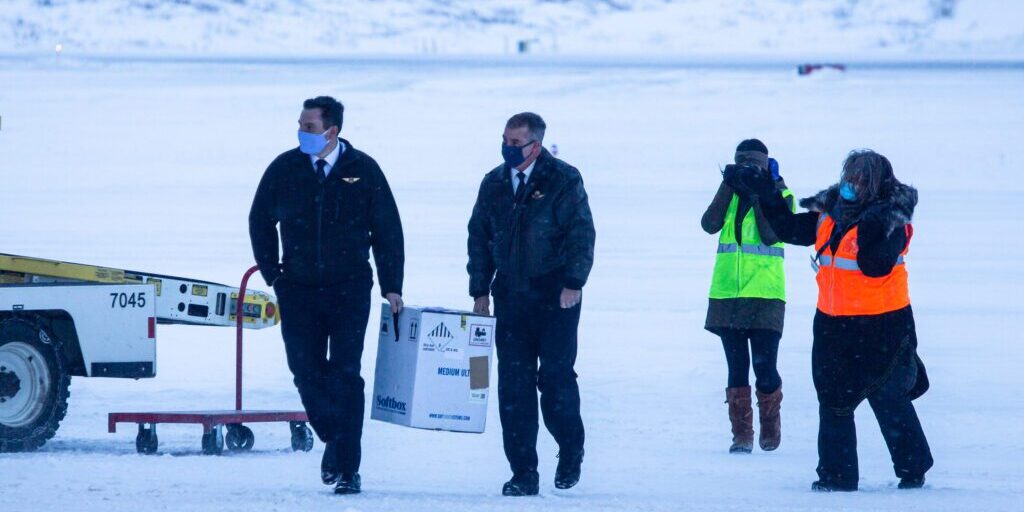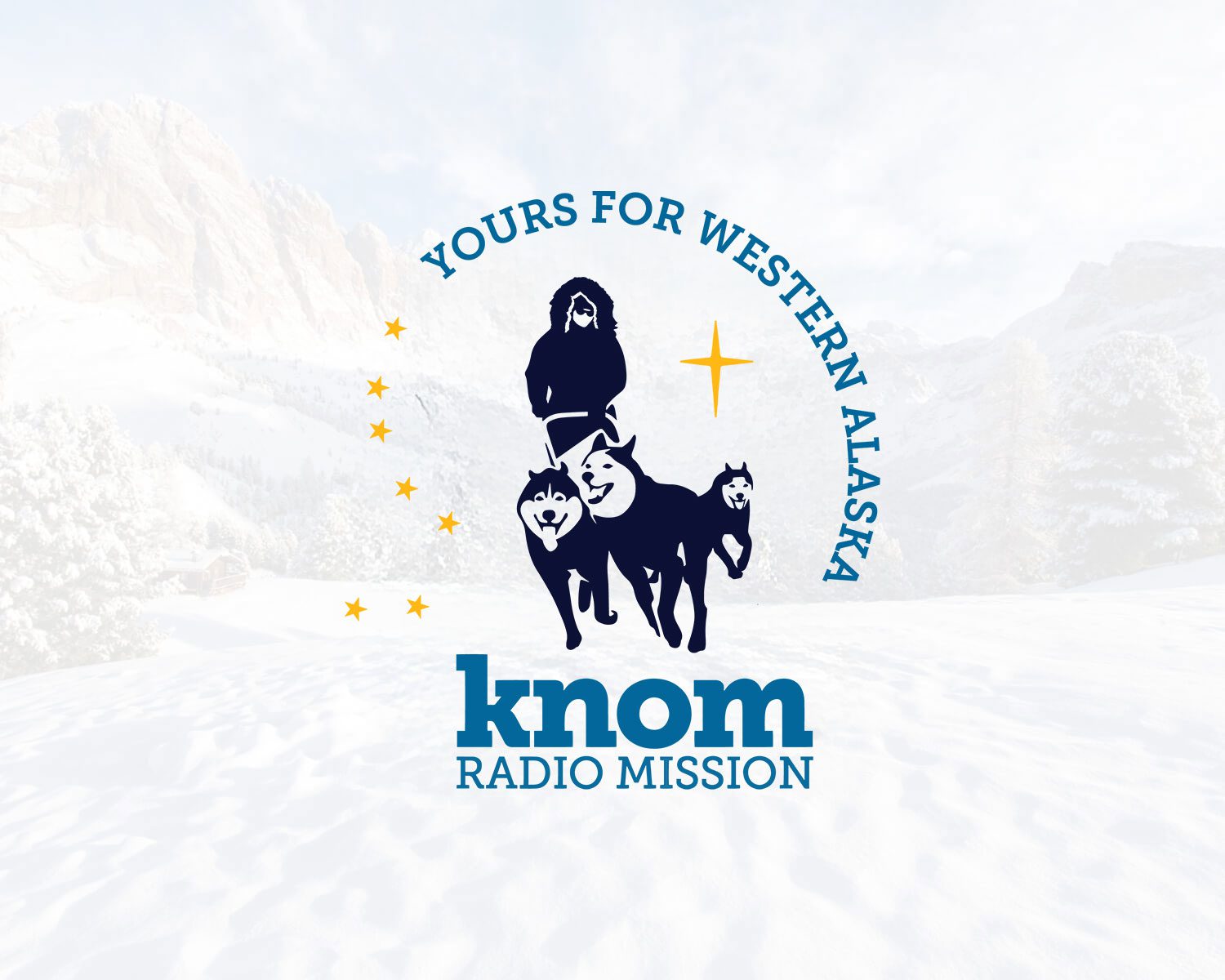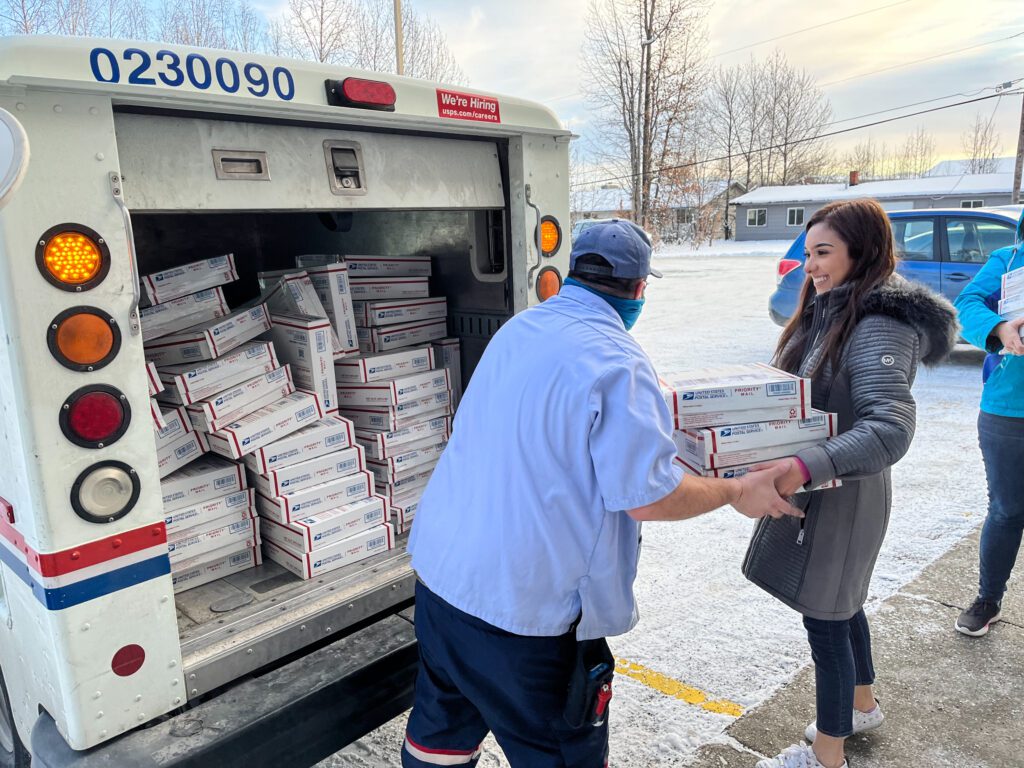January
The year begins with the arrival of vaccines for COVID-19 in Nome. Western Alaska is one of the first regions in the Untied States to receive the vaccine, and several communities rally to slow the infection rate. Also, a brave power crew in Unalakleet repair an overhead line in the middle of a major winter storm, preventing long-term damage.
Photo above: The first box of vaccine vials touches down in Nome.
February
Schools return to in-person learning across the Bering Strait region, after a year of unprecedented creativity from the region’s teachers. Without internet access, distance learning meant students mainly learned from activity sheets dropped on their doorsteps and individual phone calls with teachers.
At KNOM, high school student Sara Bioff starts an after-school internship where she shadows radio staff to learn broadcasting on-the-job.

March
The Nome Native Youth Olympics team mails in-home kits to students across the region so they can practice the ancient games at home.
An Alaska internet company now offers unlimited high-speed internet access in the cities of Nome and Kotzebue. Meanwhile the villages continue to pay high costs for slow internet speeds and phone service to homes and workplaces.

April
In an inspiring feat, the first disabled snowmachiner finishes the 2,600-mile long Iron Dog Snowmachine Race with his brother. Live from the halfway marker, double amputee Israel Hale encourages listeners to keep going in the face of pain. During the Iditarod race, the news team digs into the archives for historical moments and report a special feature on female mushers.
A group of female community leaders come forth to share their experiences of sexual violence. A series of reports investigate the lack of prosecution in Nome, garnering statewide attention.

May
Vi Waghiyi of Savoonga is appointed to a presidential advisory council on environmental justice, after decades of fighting pollution and working for environmental health justice.
Also, the US Coast Guard sends two ice breakers past Western Alaska, reasserting American sovereignty in the north and focusing the nation’s eyes on the Bering Sea coast.

June
A late spring in Nome results in the characteristic “green slime” flowing down the streets as the snow melt mixes with leftover World War 2-era fluorescent dye.
The village of Stebbins celebrates a major investment in infrastructure after funding for residenital water and sewer is announced.
In Brevig Mission, fourth-grader Kopeck Kaitlyn Alston wins the first statewide spelling bee for Inupiaq words.

July
In Nome, a small radio station celebrates fifty years on the air. KNOM 780 AM first went on the air in 1971, making it America’s oldest Catholic radio station. While waiting for a new cohort of volunteer fellows to arrive, Les Brown, KNOM’s longest-running volunteer, and General Manager Tony Calumet join forces to create a live graduation ceremony for high school students. Around the same time, major repairs commence at the mission’s transmitter site.
Nome’s annual e-waste recycling event celebrated its ten-year anniversary by reaching a major milestone of 10,000 lbs of waste recycled.

August
The ‘Nome Static’ newsletter is filled with stories of the 50th anniversary celebration for friends and beloved benefactors who were unable to attend in person.
Notably, longtime volunteer Les Brown is honored with an homage to his overnight signoff, informing listeners it’s time to get milk and cookies.

September
In Diomede, miles from the Russian border, locals begin building a new energy-efficient grocery store after using the old and ill-equipped Catholic church as a food storage site.
In Unalakleet, residents are trained to use drones to collaborate with the Coast Guard in gathering local information about coastal erosion, wildlife movements, and more.

October
In one of KNOM’s first village reporting trips since the beginning of the pandemic, listeners follow Gary Bekoalok to learn about archeological excavations near his home of Shaktoolik.
A new spot series features “Love Letters to Home” from rural students away for college: short, affirming, and strengthening messages about what they love most about their home communities.

November
A new clinic is opened in Shishmaref, allowing for more appointments and more specialized healthcare for the 500 residents of the village. In particular, the new facilities will improve access to dental procedures.
A research group hosts a training session about suicide prevention among youth in the region. Two leaders describe successful models from their communities. Both emphasize increasing the healthy and positive experiences that are present in young people’s lives.
KNOM conducts some research of its own, finding out what listeners most want to hear on the airwaves.

December
In Nome, a eucharistic procession by Father Kumar and KNOM draws a crowd. A new series of reflective Advent inspirations and Christmas programming begins just as radios and antenna boosters arrive in homes all across Western Alaska.
The mission publishes a pledge to its faithful benefactors, available in its entirety here.








